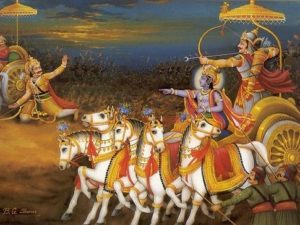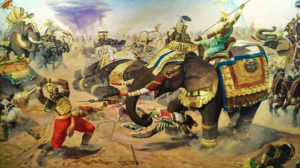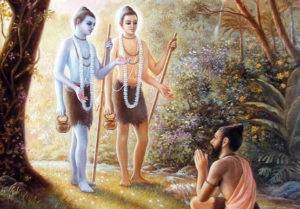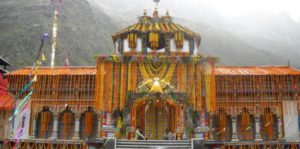Sri Krishna says to Arjuna:
“O invincible one, you are Nara and I am Hari Narayana, and we, the sages Nara-Narayana, have come to this world at the proper time.” – Vanaparavan, Mahabharatha
Shiva says to Arjuna:
“In former birth you were Nara and with Narayana as your companion, performed austerities for thousands of years at Badari” –Vanaparavan, Mahabharatha
Arjuna
Arjuna was one of the five Pandava brothers of the Mahabharata epic. He was born to Kunti and and king Pandu with the energy of Indra, the leader of the gods. At a very young age he got acclaim for his sincerity and skill in archery. He was known for his steadfastness and single mindedness in pursuing his goals.
He was known by different namesm or rather titles, such as Phaalgun, Keerti, Paartha, Savyashachee, Dhanajaya and so on. During his sojourns to far away places in the subcontinent, he married Chitrangada, daughter of the king of Manipur and Ulupi, a naga princess. Two brave warrior sons were born to him. They were Abhimnyu through Subhadra and Bhabhruvahana through Chitrangada. Both his sons played an important role during the Mahabharata war.
 He had a powerful bow by the name Gandiva, which helped him enormously in slaying his enemies. He got it from Varuna, the Vedic god of rain through Agni the god of fire. He also received a divine golden chariot from the latter as a gift which helped him to fight battles with Indra, his godfather and later with the Kauravas his cousins.
He had a powerful bow by the name Gandiva, which helped him enormously in slaying his enemies. He got it from Varuna, the Vedic god of rain through Agni the god of fire. He also received a divine golden chariot from the latter as a gift which helped him to fight battles with Indra, his godfather and later with the Kauravas his cousins.
During the exile, when all the Pandava brothers had to leave behind their kingdom and wander in the forests for twelve years as a part of their agreement with the Kauravas, Arjuna had a strange encounter with Lord Siva from whom he got Pasupatha. During the same period he met with Indra and other gods in the heavens from whom he received training and also helped them in return by slaying some asuras. While he was in the heavens he displeased Urvashi, the heavenly nymph, by turning away her advances. She cursed him out of anger to turn into a eunuch for a year in his life as chosen by him.
Apart from archery, he also excelled in the arts of dancing, singing and acting which enormously helped the Pandavas when they had to stay in the court of Virat in total disguise as a part of their agreement with the Kauravas in the thirteenth year of their exile. Arjuna took advantage of the curse he got from Urvashi and turned himself into Brihannala, a eunuch and acted as dance master for the royal household, especially Uttara, the daughter of Virat. At the end of the one year stay, he helped king Virat by fighting a battle with Kauravas who invaded his kingdom. After realizing that the five people who working in his court were indeed Pandavas in disguise, king Virat offered to marry his daughter to Abhimanyu the son of Arjuna in return for the services rendered by the brothers, a marriage that proved crucial in the post mahabharata period as the son borne out of the wedlock was the only surviving member of the Pandava clan.
By virtue of his inner purity and his loyalty to Lord Krishna, Arjuna had the fortune of receiving the divine knowledge of the Bhagavad-Gita. In the Mahabharata war he played a very crucial role by slaying such warriors as Bhishma, Karna, Dronacharya and Jayadhrata. The character of Arjuna symbolizes purity, integrity, loyalty and valor. He had many temptations and dilemmas in his life but always chose to remain on the side of God and with his brothers in their trials and tribulations.
 He could have been a great king in his own right, but he remained loyal to his elder brother Dharmaraj who ascended the throne of Hastinapur by virtue of being the eldest in the family. After the battle of Mahabharata, he assisted his brother greatly in expanding their empire by annexing several outlying kingdoms and defeating warring tribes. Strangely after the passing away of Lord Krishna, he forgot most of his skills as an archer and spent the rest of his life in humility and devotion. Arjuna serves as an example of a great human being, a dutiful householder, a loyal brother, a great warrior, a devout husband and a sincere devotee of God.
He could have been a great king in his own right, but he remained loyal to his elder brother Dharmaraj who ascended the throne of Hastinapur by virtue of being the eldest in the family. After the battle of Mahabharata, he assisted his brother greatly in expanding their empire by annexing several outlying kingdoms and defeating warring tribes. Strangely after the passing away of Lord Krishna, he forgot most of his skills as an archer and spent the rest of his life in humility and devotion. Arjuna serves as an example of a great human being, a dutiful householder, a loyal brother, a great warrior, a devout husband and a sincere devotee of God.
Arjuna – The Maharathi
The Hierarchical Classification of Warriors in Mahabharata War is as follows:
- Padatik– Infantrymen.
- Ashvarohi – Horseman. One Ashvarohi = 12 Infantrymen.
- Gaja – Soldier on an Elephant. One Gaja = 12 Ashvarohi.
- ArdhaRathi – A soldier on a chariot who is considered equal to one Gaja.
- Rathi– A warrior who is considered equal to 12 Ardharathis
- AtiRathi – A warrior who is considered equal to 12 Rathis
- Maharathi – A warrior who is considered equal to 12 Atirathis
- Ati-Maharathi – A warrior who is considered equal to 12 Maharathis.
- Mahamaharathis – A warrior who is considered equal to 24 Ati-Maharathis.
The above ranks are not just a reflection of skill or mastery of a weapon. It also includes knowledge of battle formations, strategic skill set, tactical knowledge, past battle field experiences, ability to crack”battle traps” or enemy formations and so on. Simply because an archer rode a chariot did not make him a Rathi – the warrior needed to have some fearsome reputation and class battle experience too.
Yudhisthir and Bheema both are considered Rathis but their respective sons – Prativindhya and Sutasoma are Atirathis. You may wonder why is that when both Yudhisthir and Bheema are more experienced than their sons? The reason is – Prativindhya and Sutasoma were highly skilled in battle plans, strategies, forming bottlenecks and tackling different battle formations (“Vyuhas”). They also had mastery of all forms of weapons which includes bows and arrows, mace, sword and spear.
Abhimanyu – the youngest son of Pandava family is a Maharathi. This is because he had knowledge of breaking the Chakravyuha and knew how to move the fastest in the battlefield. Only Abhimanyu and Arjuna had the mettle of tackling Drona, Bheesma, Aswathhama and other Maharathis from Kaurava side.
Chakravyuh was a brilliant military tactic. Basically it was a juggernaut. The whole formation continuously spun across the battlefield, continuously fighting, and the moment one member of the formation was killed, there was a sliding motion that propagated from the position held by the killed man, right upto the center of the formation, thus ensuring that at all times, there existed a continuous maze.
So one Abhimanyu/ Arjuna (Maharathi) is equal to 12 X 12 = 144 Yudhisthirs.
Arjuna The Chosen One
Nara-Narayana (Sanskrit: नर-नारायण; nara-nārāyaṇa) is a Hindu deity pair. Nara-Narayana is the twin-brother incarnation of the preserver-god Vishnu on earth, working for the preservation of dharma or righteousness. In the concept of Nara-Narayana, the human soul Nara is the eternal companion of the Divine Narayana.
The Hindu epic Mahabharata identifies god Krishna with Narayana and Arjuna – the chief hero of the epic – with Nara. The legend of Nara-Narayana is also told in the scripture Bhagavata Purana. Hindus believe that the pair dwells at Badrinath, where their most important temple stands.
 The Nara-Narayana pair is frequently worshipped in temples of the Swaminarayan Faith. The followers of the sect believe that their founder Swaminarayan is an incarnation of Narayana.
The Nara-Narayana pair is frequently worshipped in temples of the Swaminarayan Faith. The followers of the sect believe that their founder Swaminarayan is an incarnation of Narayana.
Krishna and Arjuna are often referred to as Nara-Narayana in the Mahabharata and are considered part incarnations of Narayana and Nara respectively, according to the Bhagavata Purana
In a previous life, the duo were born as the sages Nara and Narayana, and who performed great penances at the holy spot of Badrinath. Nara and Narayana were the Fifth Avatar of Lord Vishnu. The twins were sons of Dharma, the son of Brahma and his wife Murti (Daughter Of Daksha) or Ahimsa .
 They live at Badrika performing severe austerities and meditation for the welfare of the world. These two inseparable sages took avatars on earth for the welfare of mankind and to punish the wicked ones. The sages defeated a demon called Sahasrakavacha (“one with a thousand armours”). Legend has it that once Lord Shiva tried to bring the fame of Nara and Narayana before the entire world. To do that, he hurled his own potent weapon Paashupathastra at the meditating rishis. The power of their meditation was so intense that the astra lost it’s power before them. Lord Shiva stated that this happened since the duo were jnanis of the first order constantly in the state of Nirvikalpa Samadhi.
They live at Badrika performing severe austerities and meditation for the welfare of the world. These two inseparable sages took avatars on earth for the welfare of mankind and to punish the wicked ones. The sages defeated a demon called Sahasrakavacha (“one with a thousand armours”). Legend has it that once Lord Shiva tried to bring the fame of Nara and Narayana before the entire world. To do that, he hurled his own potent weapon Paashupathastra at the meditating rishis. The power of their meditation was so intense that the astra lost it’s power before them. Lord Shiva stated that this happened since the duo were jnanis of the first order constantly in the state of Nirvikalpa Samadhi.
Arjuna and Bhagavad Gita
The Bhagavad-gita (“Song of God”) is a conversation between the military commander Arjuna and his friend and charioteer Krishna, before the onset of the historic Battle of Kurukshetra. Topics they discuss include the immortality of the self, the ultimate goal of life, the perfection of yoga, and the original relationship between the self and the Supreme Self.
 The Gita appears as a central chapter in the epic Mahabharata, which chronicles the history of greater India up to the start of the current Kali-yuga, the “age of quarrel,” circa 3000 BCE. Kurukshetra is now a district in the state of Haryana, India.
The Gita appears as a central chapter in the epic Mahabharata, which chronicles the history of greater India up to the start of the current Kali-yuga, the “age of quarrel,” circa 3000 BCE. Kurukshetra is now a district in the state of Haryana, India.
As the conversation begins, Arjuna decides to walk away from battle rather than fight with those who had cheated his family of their kingdom. Krishna then enlightens Arjuna about the science of the self, the essence of dharma (“duty”), and the ultimate goal of life. Krishna reveals His identity as the Supreme Being, explaining that He had planned the battle, as well as pre-ordained the outcome. Finally, Arjuna surrenders to Krishna’s supreme will and decides to fight.
In the Gita, Krishna explains the difference between spirit and matter, the goal of the yoga system, how one’s vision becomes distorted by attachment to temporary things, and the superiority of devotional service to the Supreme Being to any other process of self-realization.
Reference: Hindu Human Rights
You may also like
-
PM Launches the Kindle Version of Swami Chidbhavanandaji’s Bhagavad Gita
-
PM Releases Manuscript with Commentaries by 21 Scholars on Shlokas of Srimad Bhagavadgita
-
Gita, A Military Manual, Should Be Read By All, Says Maj Gen Sharan
-
PM Modi Unveils ‘Astounding’ 800-Kg Bhagavad Gita
-
Bhagavad Gita – Understanding Kurukshetra War

